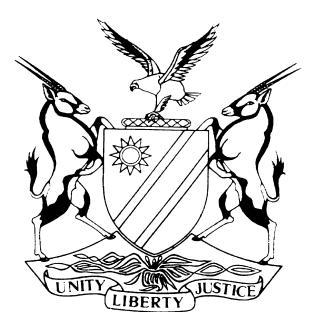NOT REPORTABLE 

HIGH COURT OF NAMIBIA MAIN DIVISION, WINDHOEK
REVIEW JUDGMENT
Case no: CR 11/2019
In the matter between:
THE STATE
v
TERRENCE GURIRAB ACCUSED
(HIGH COURT MAIN DIVISION REVIEW REF NO. 1585/2018)
Neutral citation: S v Gurirab (CR 11/2019) [2019] NAHCMD 16 (07 February 2019)
Coram: USIKU, J and UNENGU, AJ
Delivered: 7 February 2019
Flynote: Criminal Procedure – Drug offences – accused charged, convicted and sentenced for both dealing in and possession – Convictions on both counts irregular and amount to a duplication of convictions.
Summary: The accused pleaded not guilty to the main count of dealing in dependence producing substance and guilty to possession of the same substance. Despite being convicted of possession and the prosecutor accepted the plea of guilty and the facts admitted by the accused, the magistrate allowed the prosecutor to lead evidence on the main count of dealing in and convicted the accused for both counts. Therefore, the court held that it is irregular and a duplication of convictions to convict the accused for both the main and the alternative counts.
Held further, that to do justice to the accused, is to quash the conviction and sentence on the main count.

ORDER

(i) The conviction and sentence on the main count are hereby set aside.
(ii) The conviction and sentence on the alternative count are confirmed.

REVIEW JUDGMENT

UNENGU, AJ (USIKU, J concurring):
[1] The accused in this matter was charged with, convicted of and sentenced for both dealing and possession of dependence producing drugs.
[2] The drugs are involved in both the main count (dealing) and the alternative count of possession. Dealing in dependence producing substance is a contravention of s 2(a) read with sections 1, 2,(i) and/or 2(ii), 8, 10, 14 and Part 1 of the schedule of Act 41 of 1971 as amended, while possession is an offence under the provisions of s (b) read with similar sections cited in s 2(a) above.
[3] It is trite law that although dealing in and possession of dependence producing substance are two different offences in terms of Act 41 of 1971, a person cannot be convicted and punished for dealing and possession of the same drugs. Doing so, will amount to a duplication of conviction which is not permissible in law. Which is why these offences are charged as the main (dealing in) and alternative count (possession) to avoid a duplication of convictions.
[4] In the present review matter, the accused pleaded not guilty to dealing and guilty to possession of the drugs. When asked to disclose the basis of his defence for pleading not guilty to the main count, the accused made it clear that he only possessed the drugs but had no intention to sell the substances.
[5] The accused was then questioned in terms of s 112(1)(b) of the Criminal Procedure Act1 (the CPA) on possession of the drugs to which he had pleaded guilty. He was convicted as pleaded after the prosecutor accepted the facts admitted by the accused when questioned by the court.
[6] Despite the conviction on possession, the learned magistrate still proceeded and allowed the prosecutor to lead evidence in respect of the main count, convicted the accused again on the main count and subsequently sentenced the accused for both the main and the alternative counts.
[7] It is irregular for the court to call for evidence on the main count after the prosecutor has accepted a conviction on the alternative count. Only if the prosecutor had refused to accept the facts admitted by the accused on the alternative count before entering a verdict of guilty on the alternative count, could the prosecutor proceed to call witnesses to testify in order to prove the main count.
[8] In the present matter, the prosecutor accepted the plea of guilty on the alternative count whereafter the magistrate questioned the accused in terms of s 112(1)(b) and convicted him. That should have been the end of the story. The main count fell away and the only count remained was the alternative count, namely possession of dependence producing substance. It is a duplication of convictions to convict an accused person of both the main and the alternative counts.
[9] In his response to the query, the magistrate conceded to the mistake and indicated that his intention was to sentence the accused on the alternative count alone.
[10] The mistake conceded to will be rectified to do justice to the accused person. The accused admitted possession of the substance at the start of the proceedings and denied dealing in them.
[11] Therefore, it is just, fair and in accordance with the demands of justice to quash the conviction and sentence on the main count and confirm the conviction and sentence on the alternative count.
[12] In the result, the following order is made:
(i) The conviction and sentence on the main count are hereby set aside.
(ii) The conviction and sentence on the alternative count are confirmed.
----------------------------------
E P UNENGU
Acting Judge
----------------------------------
D N USIKU
Judge
1 Act 51 of 1977 as amended.